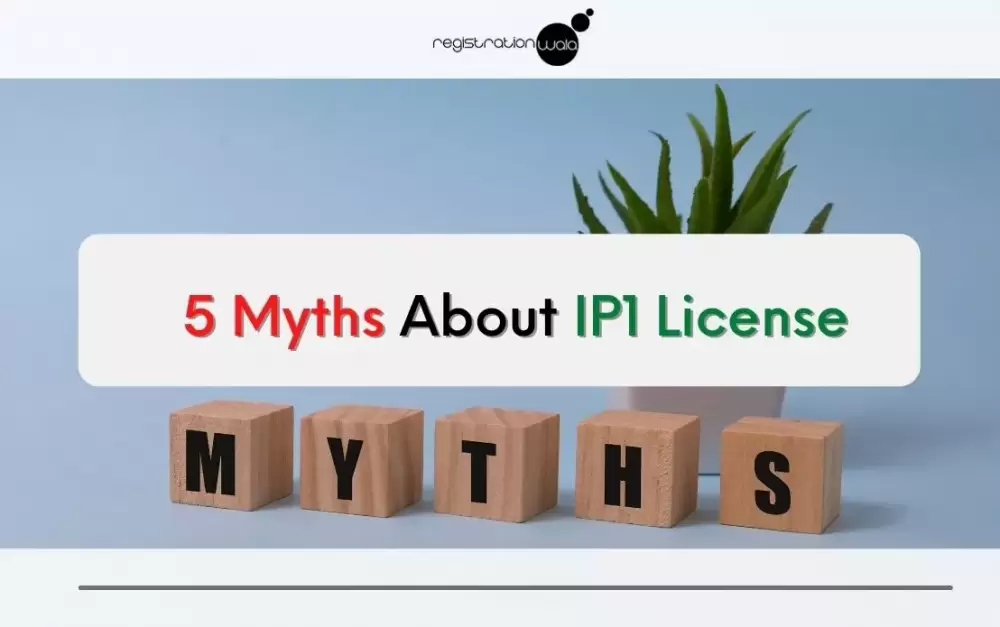Know The 5 Myths About IP1 License In India
- February 01, 2022
- Registrationwala

- Home
- /
- Knowledge Base
- /
- Other Registrations & Licenses
- /
- IP1 License
- /
- Know The 5 Myths About IP1 License In India
Know The 5 Myths About IP1 License In India
Infrastructure providers who wish to supply telecom service providers with passive telecom resources require the IP1 license. And because the telecommunication sector of India has evolved, the demand for this certificate has increased. However, that rise comes with belief in several myths about the license that make it harder for the aspirants to get the license on time. What are those myths? This article will shine a light on them to reveal their truth.
There are several ways entrepreneurs are engaging with the telecommunication sector. Some decide to become service providers, others decide to supply those providers with bandwidth. And there are those who support the telecom sector of India by providing passive infrastructure.
Known as the infrastructure providers, these entrepreneurs provide the telecom resources that enable the TSPs and ISPs to render their facilities properly and to everyone. These resources include:
- Right of Way
- Duct Space
- Cell Towers
- And, Dark Fibers
Myth 1: The procedure to procure the IP1 license is online
Because most of the telecom licenses follow an online procedure, people mistakenly believe that the same goes for the certificate to become an infrastructure provider. But alas, that isn’t the case. Because the nature of infrastructure the licensee provides is passive – non-electric – the procedure for the license consists of an old school offline approach.
Truth: The procedure to acquire the IP License is still offline. The Department of Telecommunication expects you to fill out the application form manually and submit it physically at the DOT regional office.
Myth 2: A high net worth is required to provide the passive telecom infrastructure
Right of way, cell towers, antennas, Duct Space and Dark Fibers, none of these telecommunication resources is inexpensive. It has created a misbelief among the aspirants that the DOT requires them to fulfill the net worth criteria to obtain the license. Believing that they can’t start a business until their business is nearly worth thousands of Crores - they decide against applying for the license.
Truth: No net worth requirement exists for an Ip1 license. While it is granted that the licensee must have some capital considering the nature of the infrastructure he provides, that doesn’t mean that DOT set up any specific financial requirements for the license.
Myth 3: Infrastructure providers can cater to Crypto enthusiasts
The rise of crypto enthusiasts because of the craze of blockchain has made everyone run towards it. Because it takes a lot of hardware to mint the ETH from the blockchain, people think infrastructure providers can facilitate them with the hardware required. It is a belief that leads to many crypto enthusiasts becoming IP1 license aspirants.
Truth: Infrastructure providers are only those that provide telecom resources to telecom companies. They have no relations with blockchain and thus, should not be considered a part of their domain.
Myth 4: It is the only license that DOT can issue on an individual basis
“The license to become an infrastructure provider can be issued on an individual basis.” – it is a belief held by those people who think procuring the license is easy. They think that since it is not a laborious task to acquire this certificate, DOT might issue it to individuals.
Truth: Under no circumstance, the DOT issues any telecom certificate on an individual basis. Whether it is the license to start an ISP or the certificate to become a National Long Distance Operator, having a registered business entity - a private limited company – is a mandatory requirement.
Myth 5: You can provide bandwidth as an infrastructure provider
An infrastructure provider, in a modern context, has taken several meanings. Among them is the provider of cloud platforms – allowing companies to operate their business, store the details and manage them remotely. People are believing that the Ip1 license is the one that allows them to become the providers of this service.
Truth: The IP1 license is not meant for active infrastructure. And since cloud computing falls under the “active” telecom resource, getting an IP1 license won’t allow you to facilitate it to your clients.
Conclusion
Digital Infrastructure Providers can’t get the Ip1 license, that right is only for those who can support the telecom sector with passive telecom resources. In this article, we have revealed your eyes to the truth of this license. So, now you have the information necessary so that you get the license on time, as you bypass the chasm of misinformation.
If you still wish to know more or are more confused about this DOT-issued authorization, contact Registrationwala. We can provide you with the answers that you need.
There are many myth about IP1 license that are needed to be talked about. This article reveals those myths to you in a clear fashion. Contact us for more info.
- 3283 views
